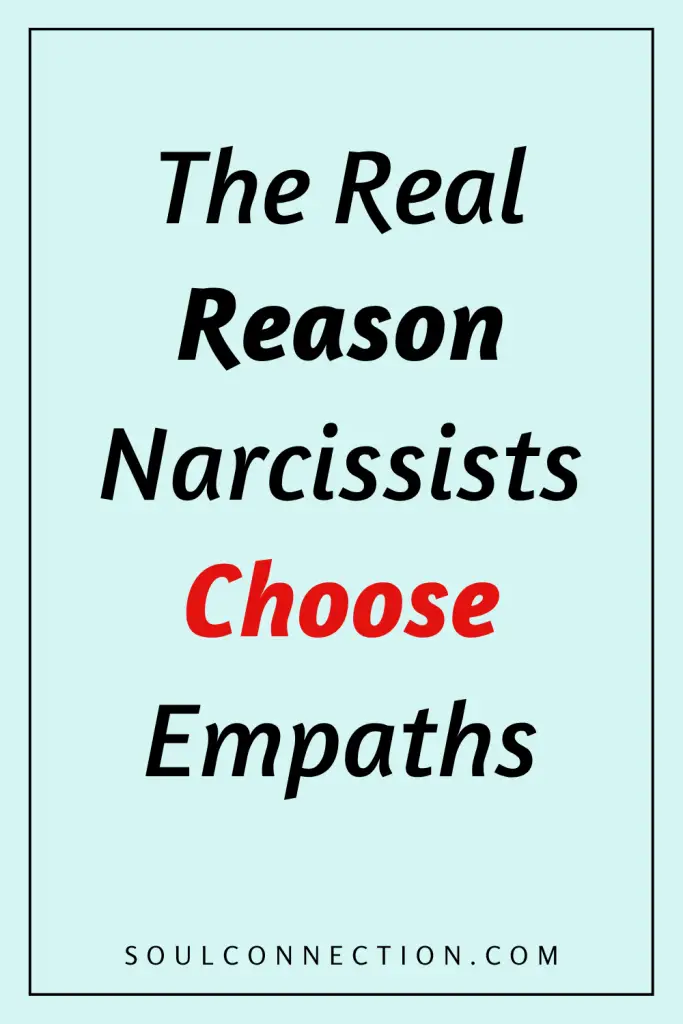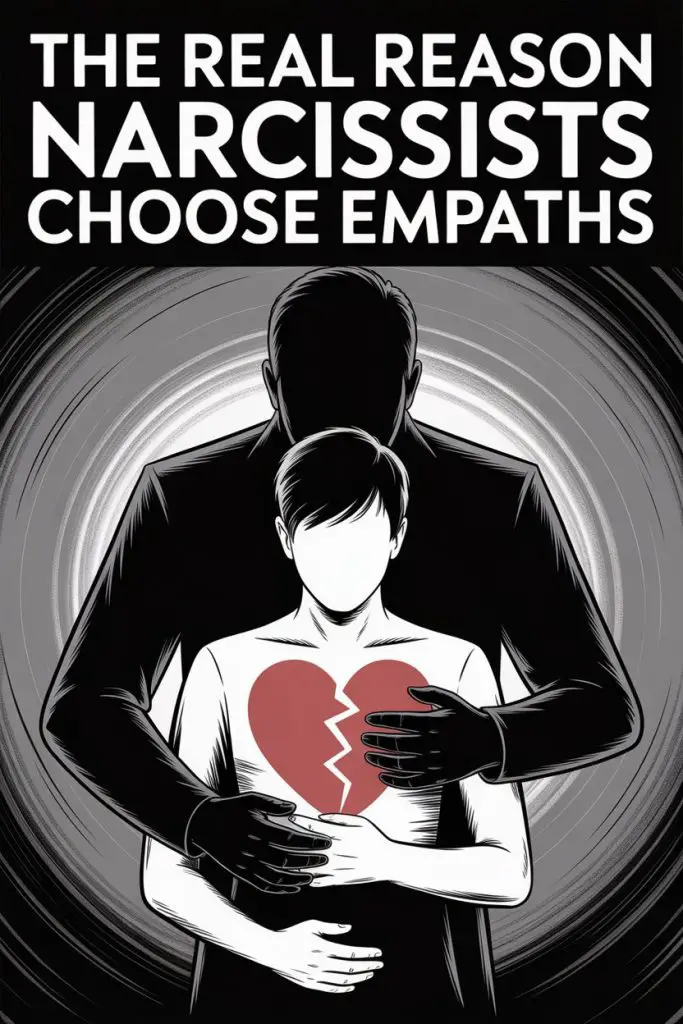You’ve probably heard this one before: narcissists and empaths are drawn to each other like moths to a very complicated flame.
One is busy soaking up everyone’s feelings like an emotional sponge, the other is searching for someone who’ll apply all their energy toward glorifying, fixing, and excusing them. The result? A connection that’s as magnetic as it is maddening.
If you’ve ever wondered why narcissists are so laser-focused on empaths, well, you’re not alone—and you’re definitely not being dramatic.
Let’s get to the heart of the matter—preferably before anyone starts love bombing.
Empaths Are Emotional Wi-Fi
Empaths have an uncanny ability to tune into the emotional frequencies of everyone around them. If there’s a sad puppy in the room, an empath will notice it—yes, even if it’s just a painting.
This sensitivity is a gift, but it’s also a beacon.
To a narcissist, an empath’s heightened attunement isn’t just attractive; it’s irresistible. Narcissists are looking for someone who’ll instantly pick up on their needs, moods, and (heaven help us) their silent suffering.
Empaths sense the narcissist’s pain, loneliness, and desire for validation, and their impulse is to help, heal, and rescue.
Voilà: the perfect emotional Wi-Fi—always connected, never out of range, and forever running out of bandwidth.
A Narcissist’s Favorite Mirror
Narcissists need an audience. Preferably a standing ovation, but they’ll settle for one loyal fan who claps just for them.
Empaths are natural reflectors—they’ll shine back admiration, understanding, and compassion, even when the narcissist’s behavior would make most people run for the exit.
They validate, they reassure, and they stick around long after the curtain should have fallen.
This reflection isn’t just about ego-boosting. It also provides the narcissist with a sense of identity. Internally, narcissists often feel hollow, so they rely on how others see them to know who they are.
An empath, with their tendency to see the best in everyone, becomes the perfect mirror. The narcissist basks in this glow, soaking up the good vibes—until the empath’s batteries run dry.
Healing Instincts: The Empath’s Kryptonite
Empaths don’t just feel feelings—they want to fix them. If you’ve ever caught yourself thinking, “If I just love them enough, maybe they’ll change,” congratulations: you’re probably an empath.
Narcissists, on the other hand, rarely see a need to change, but they’re more than happy to let someone else try.
This sets up a dynamic where the empath’s healing instincts become their own undoing. The narcissist presents their wounds—real or exaggerated—and the empath springs into action, offering support, advice, and emotional labor.
For the narcissist, this is better than therapy and a lot cheaper.
Paradoxically, the more the empath gives, the less satisfied the narcissist becomes. The bar keeps moving, and what began as a partnership morphs into a one-sided self-improvement project with no completion date in sight.
Vulnerability: The Secret Ingredient
Empaths wear their hearts not just on their sleeves, but all over their outfit, accessories included. They’re open about their struggles, their dreams, their fears. This level of vulnerability is both beautiful and risky.
To a narcissist, vulnerability isn’t just touching—it’s an opportunity. They’ll use the empath’s openness to create a sense of intimacy early on.
“I’ve never felt this close to anyone before,” they’ll say, and the empath will believe it (because they genuinely feel it). This fast-tracked intimacy often blurs boundaries, making it harder for the empath to spot warning signs.
Once trust is established, the narcissist might exploit that vulnerability, using secrets or insecurities as leverage. It’s not always intentional at first—but it is effective.
The Empath’s Reluctance to Give Up
Empaths struggle to walk away from people in pain—especially when those people have shown glimpses of vulnerability themselves. This makes them remarkably loyal, sometimes to their own detriment.
Narcissists, sensing this reluctance, push the limits. They might apologize, promise to change, or share stories of past trauma to keep the empath invested.
The empath, ever hopeful, digs in deeper, believing that if they just hold on a little longer, things will improve.
This commitment keeps the narcissist supplied with attention, admiration, and care, even when the relationship becomes emotionally draining for the empath.
Supply and Demand: Emotional Economy 101
In the world of narcissists, “narcissistic supply” is the currency. Compliments, reassurance, even arguments—anything that feeds the ego or confirms their importance will do.
Empaths are a premium supplier. They give more, ask for less, and rarely send invoices for emotional labor.
Narcissists gravitate toward this abundance, knowing that as long as they keep the drama alive, the empath will keep delivering.
It’s not just about positive attention; even negative attention works. If the empath is upset, worried, or anxious, it still means the narcissist is at the centre of their world. And that, for a narcissist, is almost as good as love.
Why This Dynamic Is So Hard to Break
People ask, “Why don’t empaths just leave?” The answer isn’t simple. Empaths feel responsible for others’ well-being and struggle with guilt when setting boundaries.
They also tend to remember the good times (and the narcissist’s initial charm) more vividly than the bad.
Narcissists are skilled at keeping hope alive. They offer just enough affection, praise, or vulnerability to keep the empath from giving up. The cycle continues, spinning faster than a washing machine with a brick in it.
The result? Both are trapped: the empath by hope, the narcissist by their need for constant supply.
Shifting the Power Dynamic
Escaping the empath-narcissist loop requires a hefty dose of self-awareness, boundaries, and—let’s be honest—a bit of gall. Setting limits doesn’t come naturally to empaths, but it’s the only way to stop serving as someone else’s emotional all-you-can-eat buffet.
Recognizing early red flags (like love bombing, lack of accountability, and relentless self-focus) is key. It’s also helpful to practice saying “no” without apologizing, and to remember that your needs matter just as much as anyone else’s.
Therapists can help, but so can honest conversations with friends who’ll remind you that you’re not selfish for wanting a relationship with a little more balance and a lot less drama.
Turning Compassion Inward
Empaths excel at caring for others but often neglect themselves. That’s got to change—stat.
Try channeling some of that legendary empathy toward your own feelings. Ask yourself what you need, what makes you happy, and where your limits really are.
Spoiler: You’re allowed to have them, and you’re allowed to enforce them.
It’s not selfish to set boundaries or to walk away from relationships that consistently leave you feeling drained. In fact, it’s the only way to stay healthy (and keep your sarcasm as sharp as ever).
When Empaths Thrive
Empaths aren’t doomed to a life of one-sided relationships. Once you recognize your patterns, it becomes easier to spot narcissists before they’ve unpacked their emotional baggage in your living room.
Healthy relationships are built on mutual respect, shared vulnerability, and the kind of give-and-take that doesn’t leave you feeling like you’ve just run a marathon in gumboots.
If you’re an empath, aim for connections where your kindness is matched, your boundaries are respected, and your compassion is valued for what it truly is: a superpower, not a weakness.
Choosing Yourself, Not Just Others
Narcissists choose empaths because they’re generous, intuitive, and relentlessly supportive. But that doesn’t mean empaths have to say yes.
You can choose yourself—tonight, tomorrow, and every day after that. When you do, you’ll attract people who value your empathy, not just exploit it.
And your flame? It’ll burn brighter than ever, moths be damned.


